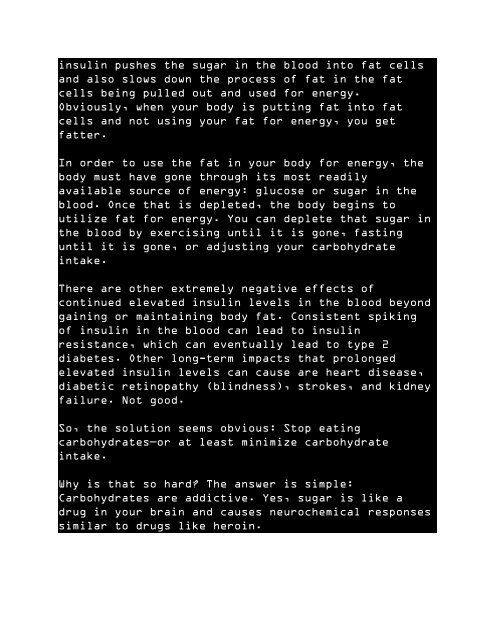Discipline Equals Freedom Field Manual by Jocko Willink ( PDFDrive.com )
You also want an ePaper? Increase the reach of your titles
YUMPU automatically turns print PDFs into web optimized ePapers that Google loves.
insulin pushes the sugar in the blood into fat cells<br />
and also slows down the process of fat in the fat<br />
cells being pulled out and used for energy.<br />
Obviously, when your body is putting fat into fat<br />
cells and not using your fat for energy, you get<br />
fatter.<br />
In order to use the fat in your body for energy, the<br />
body must have gone through its most readily<br />
available source of energy: glucose or sugar in the<br />
blood. Once that is depleted, the body begins to<br />
utilize fat for energy. You can deplete that sugar in<br />
the blood <strong>by</strong> exercising until it is gone, fasting<br />
until it is gone, or adjusting your carbohydrate<br />
intake.<br />
There are other extremely negative effects of<br />
continued elevated insulin levels in the blood beyond<br />
gaining or maintaining body fat. Consistent spiking<br />
of insulin in the blood can lead to insulin<br />
resistance, which can eventually lead to type 2<br />
diabetes. Other long-term impacts that prolonged<br />
elevated insulin levels can cause are heart disease,<br />
diabetic retinopathy (blindness), strokes, and kidney<br />
failure. Not good.<br />
So, the solution seems obvious: Stop eating<br />
carbohydrates—or at least minimize carbohydrate<br />
intake.<br />
Why is that so hard? The answer is simple:<br />
Carbohydrates are addictive. Yes, sugar is like a<br />
drug in your brain and causes neurochemical responses<br />
similar to drugs like heroin.



